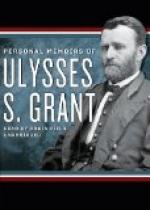Our centre and right were, at this time, extended so that the right of the right wing was probably five miles from Corinth and four from the works in their front. The creek, which was a formidable obstacle for either side to pass on our left, became a very slight obstacle on our right. Here the enemy occupied two positions. One of them, as much as two miles out from his main line, was on a commanding elevation and defended by an intrenched battery with infantry supports. A heavy wood intervened between this work and the National forces. In rear to the south there was a clearing extending a mile or more, and south of this clearing a log-house which had been loop-holed and was occupied by infantry. Sherman’s division carried these two positions with some loss to himself, but with probably greater to the enemy, on the 28th of May, and on that day the investment of Corinth was complete, or as complete as it was ever made. Thomas’ right now rested west of the Mobile and Ohio railroad. Pope’s left commanded the Memphis and Charleston railroad east of Corinth.
Some days before I had suggested to the commanding general that I thought if he would move the Army of the Mississippi at night, by the rear of the centre and right, ready to advance at daylight, Pope would find no natural obstacle in his front and, I believed, no serious artificial one. The ground, or works, occupied by our left could be held by a thin picket line, owing to the stream and swamp in front. To the right the troops would have a dry ridge to march over. I was silenced so quickly that I felt that possibly I had suggested an unmilitary movement.
Later, probably on the 28th of May, General Logan, whose command was then on the Mobile and Ohio railroad, said to me that the enemy had been evacuating for several days and that if allowed he could go into Corinth with his brigade. Trains of cars were heard coming in and going out of Corinth constantly. Some of the men who had been engaged in various capacities on railroads before the war claimed that they could tell, by putting their ears to the rail, not only which way the trains were moving but which trains were loaded and which were empty. They said loaded trains had been going out for several days and empty ones coming in. Subsequent events proved the correctness of their judgment. Beauregard published his orders for the evacuation of Corinth on the 26th of May and fixed the 29th for the departure of his troops, and on the 30th of May General Halleck had his whole army drawn up prepared for battle and announced in orders that there was every indication that our left was to be attacked that morning. Corinth had already been evacuated and the National troops marched on and took possession without opposition. Everything had been destroyed or carried away. The Confederate commander had instructed his soldiers to cheer on the arrival of every train to create the impression among the Yankees that reinforcements were arriving. There was not a sick or wounded man left by the Confederates, nor stores of any kind. Some ammunition had been blown up—not removed—but the trophies of war were a few Quaker guns, logs of about the diameter of ordinary cannon, mounted on wheels of wagons and pointed in the most threatening manner towards us.




